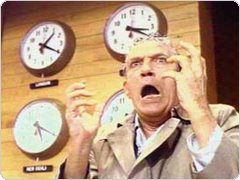"Network" Reviewed
Updated to include picture
"Network", the 1976 film directed by Sidney Lumet is a gripping, suspenseful and mind-triggering production which delves into the inner workings of a major news corporation. It leads viewers through a media crisis that turns into a seeming plus for the corporation but which ultimately leads to its ruin.
Union Broadcasting Corporation (UBS), one of the major broadcasting corporations of the time, is in the slumps in its ratings. Howard Beale, the retiring anchor for the primary news show boosts the ratings up by announcing that he will kill himself on live TV the next week.
This throws the Corporation into a dizzying spiral in which personal agendas intermi ngle. The manager, Max Shoemacher, lets Beale continue his tirade after being corporately humiliated. Beale then begins to speak as an old, disgruntled, retired newsman whose "as mad as hell and can't take it anymore." He criticizes the media and its obsession with profit seeking and lures public opinion by proclaiming that he wants to just speak the truth.
ngle. The manager, Max Shoemacher, lets Beale continue his tirade after being corporately humiliated. Beale then begins to speak as an old, disgruntled, retired newsman whose "as mad as hell and can't take it anymore." He criticizes the media and its obsession with profit seeking and lures public opinion by proclaiming that he wants to just speak the truth.
 ngle. The manager, Max Shoemacher, lets Beale continue his tirade after being corporately humiliated. Beale then begins to speak as an old, disgruntled, retired newsman whose "as mad as hell and can't take it anymore." He criticizes the media and its obsession with profit seeking and lures public opinion by proclaiming that he wants to just speak the truth.
ngle. The manager, Max Shoemacher, lets Beale continue his tirade after being corporately humiliated. Beale then begins to speak as an old, disgruntled, retired newsman whose "as mad as hell and can't take it anymore." He criticizes the media and its obsession with profit seeking and lures public opinion by proclaiming that he wants to just speak the truth. The ratings skyrocket and they give Beale his own show. Shoemacher is troubled by the way the company now views Beale, more as an object to help the company, and disregarding his personal problems, such as alchohol addiction and hallucination.
Everyone at UBS is happy, when all of a sudden Beale reveals inforamtion about how UBS is going to be bought out by CCA, a Saudi owned company. He tells Americans the truth, that their minds are controlled by the media; that the media no longer cares for individual lives, but rather the bottom-line.
After rating begin to decline as a result of this cold-shouldered statement, the largest shareholder of UBS confronts Beale in his conference room and reprimands him that he has "meddled with the forces of nature", and that the lifeblood of the world is not democracy, nor even public opinion, but rather buisness... the world is one big buisness.
A group of small-time terrorists that UBS has been using to increase ratings is used to assasinate Beale on his show. The movie ends by saying that Beale was "the first known instance of a man killed because he had lousy ratings."
This movie emphasizes the conglomerate role of the broadcasting corporation which overshadows the individual components and their well-being.
Viewers observe Dianne Christianson, the network manager, who worked her way up to the top through her motivation to increase the ratings no matter what, as her life gets truned into a dehumanized, desensualized, show in which she says that she is not capable of loving someone wholeheartedly. This is because she has gotten sucked into the corporate view, that things exist solely for their redemptive value; a testmate to what can happen to those who are not careful to separate between the real and the "theater". Unfortunately, the media in this case, is the theater.
This is a must see for all who wish to see what really drives the news coverage. Perhaps this even rivals Jon Stewart's confrontation to the hosts of Crossfire.

0 Comments:
Post a Comment
<< Home